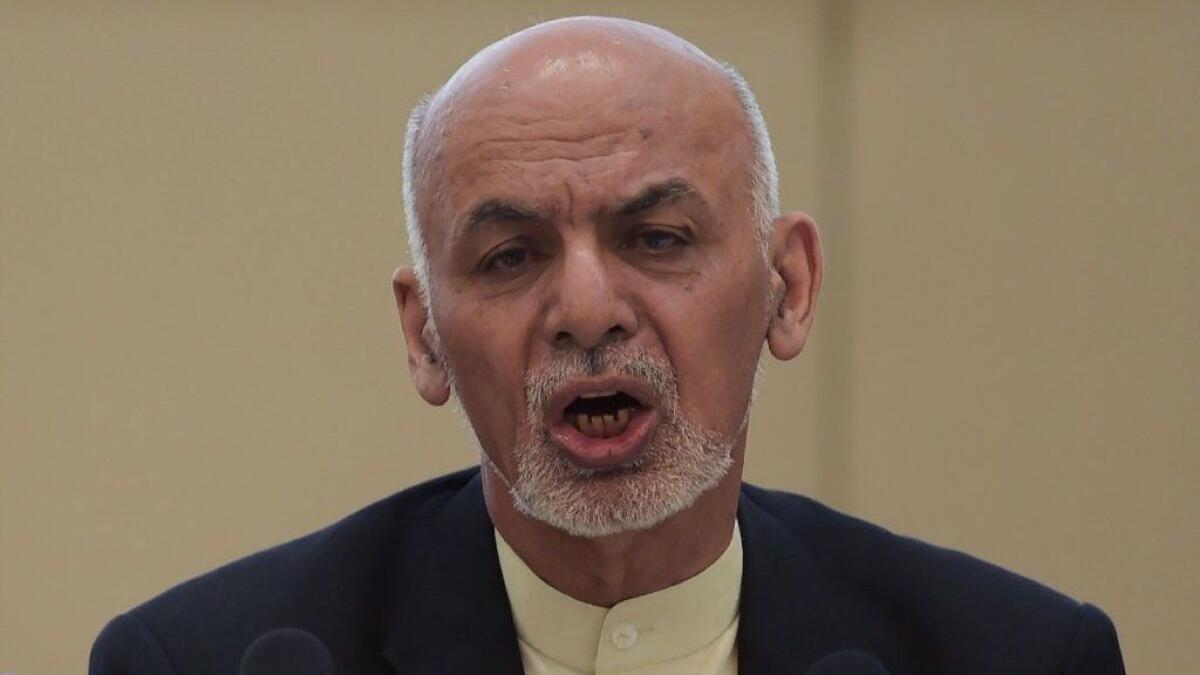Afghanistan offers amnesty to the Taliban in a bid to end 16-year war

- Share via
Reporting from KABUL, Afghanistan — Afghan President Ashraf Ghani on Wednesday extended an olive branch to the Taliban, offering amnesty for war crime convictions and recognition of the insurgent group as a political party in a bid to end the nation’s conflict, now in its 17th year.
It was Afghanistan’s most significant peace overture to the large, fractious militant organization that currently controls more territory than at any time since the 2001 U.S.-led military invasion, but whose political aims have become unclear as the war has devolved into a bloody stalemate and its top leaders have been killed.
The Taliban surprised many observers two weeks ago when it wrote in an open letter that it wanted “a peaceful resolution” to the conflict. The group did not immediately respond to Ghani’s proposal, delivered at the start of a multinational conference to promote peace talks.
Ghani called for a cease-fire and prisoner release and offered insurgents who renounce violence and recognize the Afghan government a place in the country’s political institutions.
“We are making this offer without preconditions in order to lead to a peace agreement,” Ghani told representatives of about two dozen countries to the conference, known as the Kabul Process.
The terms of the offer resembled those of a deal Ghani struck two years ago with a once-powerful insurgent group led by Gulbuddin Hekmatyar, whose forces were accused of causing thousands of civilian deaths during the 1990s but who now appears alongside Ghani at official ceremonies.
“It’s a very constructive offer with a lot of concessions to the Taliban, but we don’t know if they will accept this overture,” said Haroun Mir, an independent political analyst in Kabul, the capital.
The Taliban has lacked a strong leader since 2015, when the group announced the long rumored death of its longtime head, Mullah Mohammed Omar. The following year, Omar’s successor, Mullah Akthar Mohammad Mansour, was killed in a U.S. drone strike along the Afghan-Pakistani border.
Under Mansour’s successor, a religious scholar named Mawlawi Haibatullah Akhundzada, Taliban insurgents have all but abandoned their political pretenses and escalated violence against civilian and security targets. According to a recent Pentagon inspector general’s report, only 64% of the Afghan population lived in areas controlled by the government, down from 80% in September 2013.
After the most recent major attack, in late January, when a Taliban suicide bomber detonated an ambulance packed with explosives and killed more than 100 people near a Kabul hospital, Ghani said Afghanistan would never reconcile with the perpetrators of such attacks. President Trump also dismissed the idea, saying, “I don’t think we’re prepared to talk right now.”
But Ghani’s peace overture reflects an understanding — shared not only by the U.S. and its allies but also the Taliban — that the Afghan war will not be settled militarily and that the growing cost in Afghan lives is unsustainable.
This week, the Taliban followed up its open letter with a proposal to begin direct talks with the United States, another apparent change in stance by a group that has said it would not negotiate as long as foreign troops were in Afghanistan.
The Trump administration rejected the Taliban proposal, with State Department spokeswoman Heather Nauert saying: “Any peace talks with Afghanistan have to be Afghan-led and Afghan-owned.”
Trump has increased the U.S. military presence in Afghanistan to 15,000 troops from 11,000 at the urging of Pentagon officials, who argue the boost will force the insurgents to come to the negotiating table.
The president has also raised pressure on Pakistan — the neighbor accused by Afghanistan of sheltering and supporting the Taliban — by withholding hundreds of millions of dollars in U.S. security assistance. Pakistani officials have rejected accusations that they are soft on terrorism and said they can do without the U.S. support.
“We are not sure if the Pakistanis will bend to the pressure from the U.S.,” Mir said. “They have been able to withstand that pressure thus far because they have their allies in the region, including China and Iran.”
Ghani’s peace effort is also beset by problems in his government, an unwieldy coalition that includes former warlords and ethnic militia leaders who have challenged his authority. Atta Mohammad Noor, the strongman governor of a northern state, for more than two months has defied Ghani’s orders to leave office.
Analysts say that Ghani’s adversaries judge him as increasingly weak, desperate to make peace and possibly unable to fulfill his end of any agreement.
“Unfortunately, the overall situation is not in favor of peace in Afghanistan because of the Taliban and Pakistan’s assessments of the situation — they think they’ll win eventually,” said Davood Moradian, director general of the Afghan Institute for Strategic Studies, a Kabul think tank.
“A fragmented, divided Afghan government cannot bring peace with very resistant and confident adversaries such as Taliban and Pakistan. I think the priority has to be internal stability. The prospects for peace with the Taliban will be more promising if the government is united.”
Special correspondent Faizy reported from Kabul and Times staff writer Bengali from Mumbai, India.
Shashank Bengali is the South Asia correspondent for The Times. Follow him on Twitter at @SBengali.
More to Read
Sign up for Essential California
The most important California stories and recommendations in your inbox every morning.
You may occasionally receive promotional content from the Los Angeles Times.











